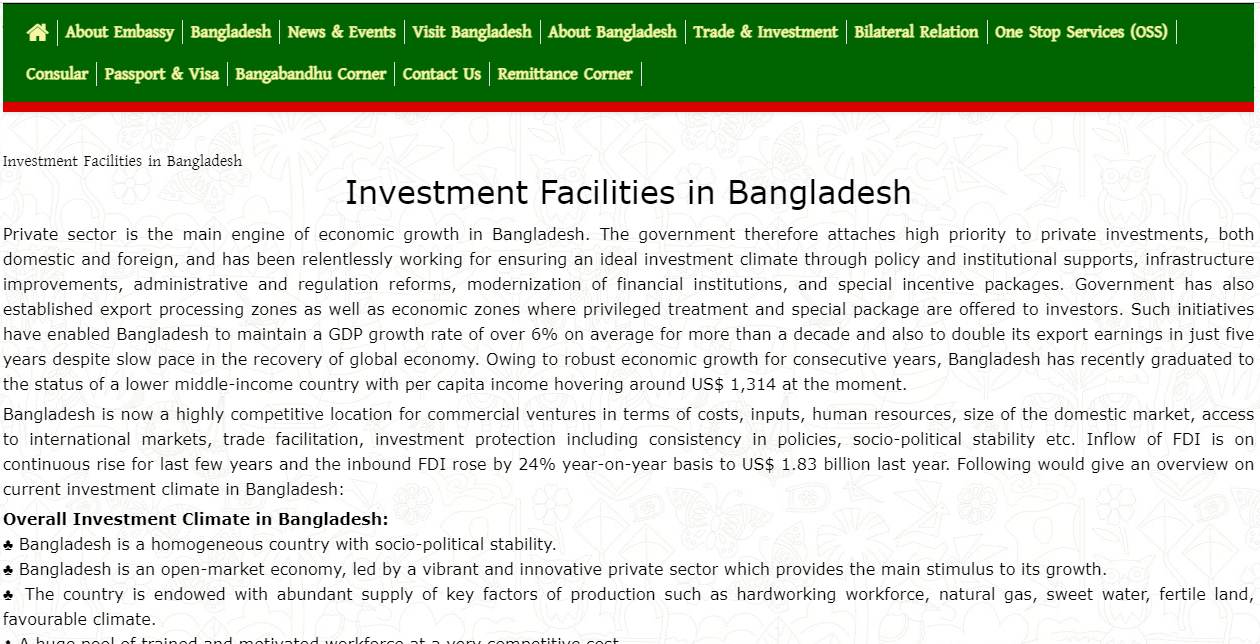Starting an investment journey involves finding the right balance between confident decision-making and careful consideration. Bangladesh attracts global investors with its vibrant culture, history, and emerging economy. Foreign investors can choose various incorporation options. This essay highlights critical factors for successful investment decisions in a challenging environment.
Before considering investment in Bangladesh, a thorough analysis of various factors is essential to make informed decisions. The investment climate in Bangladesh is shaped by the country’s economic and political stability, legal and regulatory environment, and specific policies governing Foreign Direct Investment (FDI). Evaluating the ease of doing business, backed by market research, provides valuable insights into the opportunities and challenges within the Bangladeshi market.
Infrastructure development is a crucial consideration, impacting the efficiency and cost-effectiveness of business operations. The labour market and workforce characteristics, including skills and availability, play a vital role in determining the success of an investment. Understanding taxation laws and policies, customs and trade regulations, and currency exchange rates is imperative for financial planning and risk management.
What Things to Consider Before Investment in Bangladesh?
Before considering an investment in Bangladesh, assessing various key factors is crucial. Understanding the country’s economic stability, political environment, legal framework, infrastructure, labour force, market potential, risks, socio-cultural aspects, entry strategies, due diligence, and exit plans is pivotal.
Embarking on an investment journey in Bangladesh requires meticulous consideration of various factors to ensure success in a dynamic market environment.
Prospective investors need to assess economic stability, political climate, and legal frameworks alongside infrastructure and labour force capabilities. Market research and due diligence reports offer valuable insights, guiding decisions on financing options and government incentives.
Understanding cultural nuances and religious considerations fosters effective business relationships while staying abreast of political stability and inflation rates mitigates risks.
Navigating the taxation landscape, compliance requirements, and investment restrictions is crucial, aided by bilateral treaties and regulatory frameworks. Finally, maintaining legal compliance, including trade license renewals and timely submissions, ensures operational continuity in Bangladesh’s burgeoning investment landscape.
Step-1: Prospective of business
Market Research
Conduct in-depth market research to determine your target industry’s precise opportunities and difficulties. This entails researching consumer behaviour, market trends, and rivalry. Bangladesh’s market is broad, encompassing everything from technology and medicines to textiles and agriculture. Success in the investment requires adapting it to the market’s needs. Understanding how to tap into the resources will be crucial for your business.
Due Diligence Report
A due diligence report is critical to finalizing an investment, merger, acquisition, or legal agreement. The due diligence report offers a comprehensive exploration and explanation of a property, a company’s financial records, or a company’s overall standing in the marketplace.
Financing and Funding
Consider your financing options for your investment in Bangladesh. Explore local and international banks, venture capital firms, and government incentives. The Bangladesh government has introduced various incentives and facilities for foreign investors to promote economic growth.
To qualify for incentives, the company or firm must register with the Bangladesh Economic Zones Authority BEZA, but before that, the investors need to obtain a Certificate of Incorporation/ Partnership registration, TIN, VAT Registration and Environmental clearance.
Facilitation for Accessing Lands
Selecting the right location is vital for your business’s success. Consider proximity to transportation hubs, resource access, and local demand when choosing your business’s location. BIDA can assist investors in accessing land for industrial use by introducing them to relevant agencies, such as BEZA and BEPZA, and city development authorities in different regions.
Timeframe
The time frame for your investments significantly affects your potential returns. Longer-term investments typically offer higher returns and are advisable when you have no immediate need for your savings over the next five years.
On the other hand, shorter-term investments, typically for one or two years, yield comparatively lower returns. Setting realistic timelines for your investment is essential. Be aware that bureaucracy can sometimes slow down processes in Bangladesh, so allow extra time for unforeseen delays.
Registration Costs and Categories
Understanding the cost structure is vital. Business registration fees vary depending on the amount of proposed investment and the type of business. Be sure to budget for these expenses accordingly. One of the initial considerations is the registration cost for different types of investments. Fortunately, the registration fee is the same for local, foreign, and joint venture investments.
Each category involves additional requirements and regulations, so understanding the category that applies to your investment is essential. The fee varies depending on the proposed investment amount, ranging from BDT 5,000 to BDT 100,000. A 15% Value Added Tax (VAT) applies to the registration fee.
Primary Establishment Cost
While the registration fee is significant, remember to account for other expenses like rent, labour, utilities, and more when establishing your business.
Law-Related Costs
Investing in a new market also involves understanding the legal framework and the associated costs. Be prepared to allocate funds for legal services, permits, and compliance.
Step 2: Surroundings Environment
Cultural Understanding
When investing in Bangladesh, cultural sensitivity is crucial. It’s a collectivist society where relationships and trust hold high value. Respect for hierarchy and Islam, maintaining good relationships, showing hospitality, and being serious when needed are vital for successful business interactions. Understanding local customs and practices helps build trust and prevent misunderstandings.
Religious Views
Understanding the religious nuances of the Bangladeshi market is essential. Respect for local customs and traditions can go a long way in building solid relationships and trust.
Political Stability
In Bangladesh, political stability can be a source of concern. Political decisions affect businesses through taxation, regulations, trade policies, and more, impacting industries and economies. These laws and regulations can be set at various government levels and in other countries, potentially posing political risks to companies, which can be disclosed in the Bangladesh Securities and Exchange Commission (BSEC) filings or mutual fund prospectuses. Stay informed about any political developments and their potential consequences.
Inflation Rate
Inflation affects your investments by reducing the actual value of your money over time. Fixed-income securities like government bonds may not yield the best returns as inflation erodes their value. Ignoring inflation can lead to investment losses.
Step-3: Workforce
Human Capital
However, assessing the quantity and calibre of the local labour force is crucial. Investing in training and skill development initiatives could be essential to guarantee that your company has access to the best personnel. Bangladesh presents a well-educated, adaptable workforce with competitive wages, driven by 57.3% of the population under 25. This dynamic labour force enhances its skills to meet global standards and offers English proficiency.
Bringing a Workforce from Abroad
Understanding the work permit procedures is essential for foreign investors seeking to bring skilled professionals to work in Bangladesh. In Bangladesh, work permits for foreign nationals are issued by three primary government authorities, depending on the nature of the employment:
- BIDA (Bangladesh Investment Development Authority)
- BEPZA (Bangladesh Export Processing Zones Authority)
- NGO Affairs Bureau
Work Permits for Foreigners
Foreign investors and employees can obtain work permits in Bangladesh. These permits are classified into PI (private investor) VISA for foreign investors, E2 VISA for various sectors, and E3 VISA for expatriates working in machinery and software installation, maintenance supervision, and project inspection. It’s important to note that foreign workers need to hold the appropriate VISA for working in Bangladesh.
Work Permit for Foreign Workers Duration and Application
Foreign nationals typically get one-year work permits, extendable up to five years. The application process is managed through Bangladesh Investment Development Authority’s OSS portal and an inter-ministerial committee involving document submission.
Work permits for BIDA-registered industrial projects are issued in three days when all documents are accurate. Commercial offices like branch, liaison, or representative offices usually receive work permits in 16 days under similar conditions.
Step-4: Existing Laws
Bangladesh has been making business more accessible for foreign investors, but it’s crucial to be aware of regulatory law changes that can impact your investment.
Taxation and Value-Added Tax
Before investing in Bangladesh, it’s crucial to consider the country’s taxation landscape. Bangladesh’s income tax regime is governed by the Income Tax Ordinance 1984, with annual amendments through the Finance Act. Corporate Income Tax (CIT) rates have been progressively lowered to 30% for unlisted companies and 25% for listed companies (with some sector-specific exceptions). Capital gains are taxed at 15%.
Differentiated tax rates apply based on business structure and sector. Presumptive payments and withholding taxes are standard, and a 0.6% turnover tax exists. All companies must obtain a Taxpayer Identification Number (TIN) from the National Board of Revenue (NBR) for tax reporting.
The Value Added Tax (VAT) system with a standard rate of 15% requires a thorough understanding of given exemptions and reduced rates for specific goods and services.
Strict compliance with tax and VAT regulations is essential to avoid fines and penalties, and staying updated on evolving tax laws is imperative. Engaging with local tax advisors is highly recommended to ensure a financially viable and legally compliant investment strategy in Bangladesh.
Laws for the Protection of Foreign Investment in Bangladesh
Bangladesh offers fair and equitable treatment to foreign private investment, granted complete security and protection under the Foreign Private Investment (Promotion and Protection) Act of 1980. BIDA’s One-Stop Service portal provides various services for investors, including name clearance, tax ID registration, company incorporation, and investment project registration.
Bangladesh signed 36 Double Taxation Treaties (DTTs) and 33 Bilateral Investment Treaties (BITs) as of June 30, 2022. It’s negotiating BITs with South Korea, Japan, Nigeria, Ethiopia, Qatar, and Nepal to protect investments and provide expropriation and non-discrimination safeguards.
Investment Restrictions in Bangladesh: Controlled and Restricted Sectors
Specific sectors in Bangladesh are off-limits for foreign investment, as defined by the National Industry Policy (NIP) (2016). A ‘No Objection Certificate (NOC)’ from the relevant ministry/division is often required before registering with BIDA/BEZA/Hi-Tech Park/BEPZA to invest in controlled industries.
Private industries typically can’t invest in reserved or restricted sectors. These restricted areas encompass deep-sea fishing, banking, insurance, power generation, and telecommunications. Specific information can be obtained from the Bangladesh Investment Development Authority (BIDA).
Legal Compliance
Compliance with local laws is crucial. Regulatory authorities establish compliance rules, such as the Registrar of Joint Stock Companies and Firms (RJSC) for companies and partnership firms and the Bangladesh Investment Development Authority (BIDA) for branch offices. Understand and plan for compliance.
Renew Trade License
Bangladesh investors should get a trade license through Dhaka South City Corporation (DSCC) via Bangladesh Investment Development Authority’s One Stop Service Portal. It streamlines the process, allowing online document submission and fee payment. Collaboration between BIDA and DSCC simplifies trade license renewals.
Required documents include incorporation certificates, proof of address, photos, and ID copies. Trade licenses are renewed annually and are available through local government offices. Incorporation certificates can be obtained through BIDA or the Registrar of Joint Stock Companies & Firms (RJSC&F).
Submission of Returns
Timely submission of financial returns and other documents is essential to maintain your business’s good standing.
Need Any Legal Help?
Counsels Law Partners (CLP) offers services on the companies’ registration, establishment, and related matters. However, if you need any legal help or clarification about the companies’ registration, establishment and other related matters, please reach us at:
E-mail:info@counselslaw.com
Phone: +8801700920980 (WhatsApp). +8801947470606.
Address: Jamila Villa, Flat No. C-2, House-4/A/1 (3rd Floor),
Road-02, Gulshan-1, Dhaka-1212, Bangladesh.
Frequently Asked Questions (FAQ) about Investing in Bangladesh




